U 7 Will people have robot 一般将来时will学案
人教版英语八年级上册Unit 7《Will people have robots》教学设计
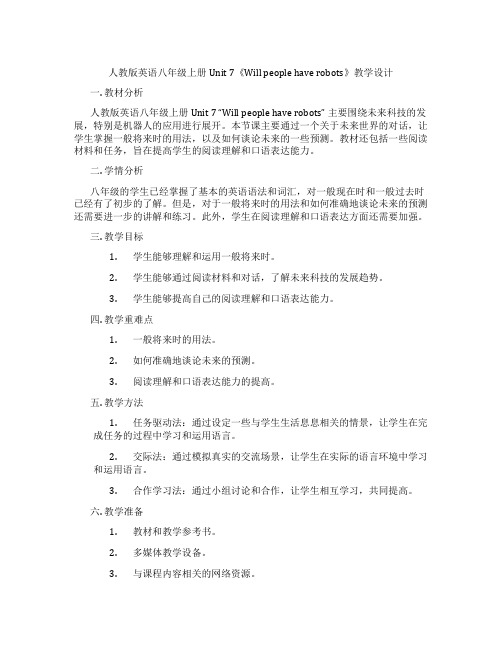
人教版英语八年级上册Unit 7《Will people have robots》教学设计一. 教材分析人教版英语八年级上册Unit 7 “Will people have robots” 主要围绕未来科技的发展,特别是机器人的应用进行展开。
本节课主要通过一个关于未来世界的对话,让学生掌握一般将来时的用法,以及如何谈论未来的一些预测。
教材还包括一些阅读材料和任务,旨在提高学生的阅读理解和口语表达能力。
二. 学情分析八年级的学生已经掌握了基本的英语语法和词汇,对一般现在时和一般过去时已经有了初步的了解。
但是,对于一般将来时的用法和如何准确地谈论未来的预测还需要进一步的讲解和练习。
此外,学生在阅读理解和口语表达方面还需要加强。
三. 教学目标1.学生能够理解和运用一般将来时。
2.学生能够通过阅读材料和对话,了解未来科技的发展趋势。
3.学生能够提高自己的阅读理解和口语表达能力。
四. 教学重难点1.一般将来时的用法。
2.如何准确地谈论未来的预测。
3.阅读理解和口语表达能力的提高。
五. 教学方法1.任务驱动法:通过设定一些与学生生活息息相关的情景,让学生在完成任务的过程中学习和运用语言。
2.交际法:通过模拟真实的交流场景,让学生在实际的语言环境中学习和运用语言。
3.合作学习法:通过小组讨论和合作,让学生相互学习,共同提高。
六. 教学准备1.教材和教学参考书。
2.多媒体教学设备。
3.与课程内容相关的网络资源。
七. 教学过程1.导入(5分钟)通过向学生展示一些机器人的图片,引起学生的兴趣,然后提问:“你们认为未来的人们会拥有机器人吗?”,让学生发表自己的看法。
2.呈现(10分钟)老师通过讲解和示范,向学生介绍一般将来时的用法,并举例说明如何准确地谈论未来的预测。
3.操练(10分钟)学生分组进行角色扮演,模拟真实的交流场景,运用一般将来时进行对话。
老师对学生的表现进行指导和评价。
4.巩固(10分钟)学生阅读教材中的阅读材料,理解并回答相关问题。
八年级英语上册-Unit-7-Will-people-have-robots备课教案-(新版)人教新
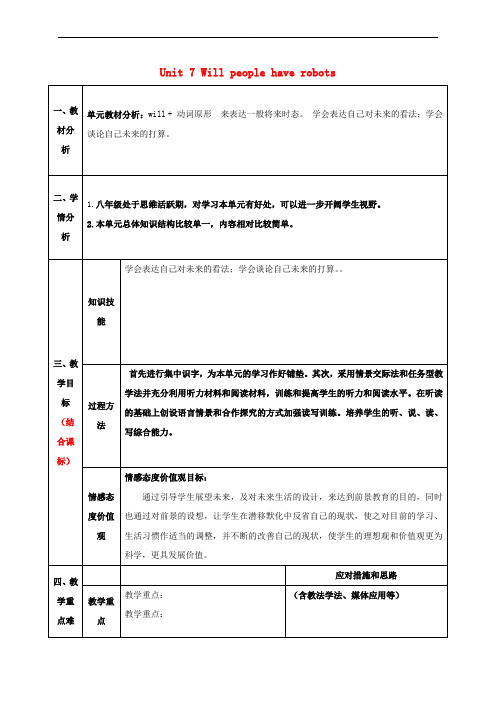
一、教材分析
单元教材分析:will + 动词原形 来表达一般将来时态。 学会表达自己对未来的看法;学会谈论自己未来的打算。
二、学情分析
1.八年级处于思维活跃期,对学习本单元有好处,可以进一步开阔学生视野。
2.本单元总体知识结构比较单一,内容相对比较简单。
教学重点:
教学重点:
1)学习掌握一般将来时态的意义和结构。
2) 掌握There be句型的一般将来时态的结构。
(含教法学法、媒体应用等)
教学难点
教学难点:
掌握more/fewer;more/less的用法。
情态动词will + 动词原形来表达一般将来时态。
(同属教学重难点的,在本栏书写)
五、课时安排
三、教学目标
(结合课标)
知识技能
学会表达自己对未来的看法;学会谈论自己未来的打算。。
过程方法
首先进行集中识字,为本单元的学习作好铺垫。其次,采用情景交际法和任务型教学法并充分利用听力材料和阅读材料,训练和提高学生的听力和阅读水平。在听读的基础上创设语言情景和合作探究的方式加强读写训练。培养学生的听、说、读、写综合能力。
Period 1 Se-2d 听说课
Period 3 Section A Grammar Focus-3c语法课
Period 4 Section B1a-1e 听说课
Period 5 Section B2a-2e 阅读课
Period 6 Section B3a-3c阅读课
Period 7 self check and unit review
六、知识结构
七、其它补充
情感态度价值观
Unit_7_Will_people_have_robots_教案(2)
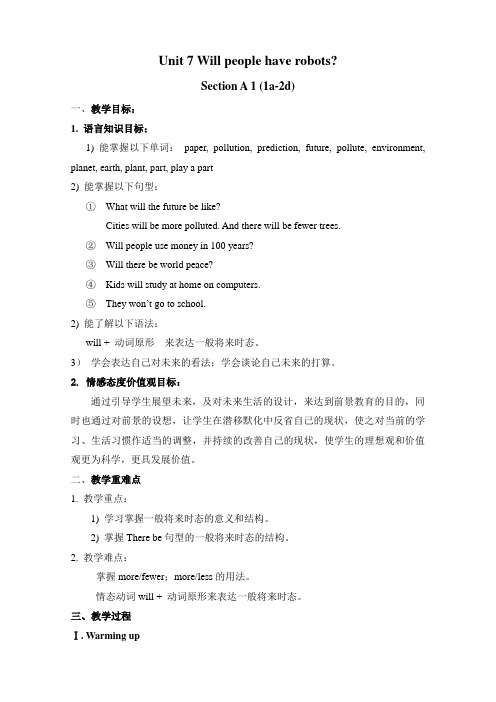
Unit 7 Will people have robots?Section A 1 (1a-2d)一、教学目标:1. 语言知识目标:1) 能掌握以下单词:paper, pollution, prediction, future, pollute, environment, planet, earth, plant, part, play a part2) 能掌握以下句型:①What will the future be like?Cities will be more polluted. And there will be fewer trees.②Will people use money in 100 years?③Will there be world peace?④Kids will study at home on computers.⑤They won’t go to school.2) 能了解以下语法:will + 动词原形来表达一般将来时态。
3)学会表达自己对未来的看法;学会谈论自己未来的打算。
2. 情感态度价值观目标:通过引导学生展望未来,及对未来生活的设计,来达到前景教育的目的,同时也通过对前景的设想,让学生在潜移默化中反省自己的现状,使之对当前的学习、生活习惯作适当的调整,并持续的改善自己的现状,使学生的理想观和价值观更为科学,更具发展价值。
二、教学重难点1. 教学重点:1) 学习掌握一般将来时态的意义和结构。
2) 掌握There be句型的一般将来时态的结构。
2. 教学难点:掌握more/fewer;more/less的用法。
情态动词will + 动词原形来表达一般将来时态。
三、教学过程Ⅰ. Warming up1. 在大屏幕上向学生展示一些机器人的图片,让学生们说出谈论自己的未来的工作,对工作的打算等:What do you want to be when you grow up?Ss:I want to be a scientist.T:How are you going to do that?Ss:I’m going to study science hard.….2. 学生们根据图片来引导出机器人这个话题。
《Unit7 Will people have robots》教学设计

Unit7 Will people have robots?Section A(1a-1c) Grade 8ⅠTeaching goals1.Words and phrases2.will 构成的一般将来时态的陈述句、否定句、疑问句及回答3.学习将来时态的相关知识,学会对未来进行预测。
ⅡImportant and difficult points1.will构成的一般将来时态的句式2.How to make predictionsⅢTeaching aidsMultimedia,blackboardⅣTeaching procedures1.Greetings2.Duty report3.Watch a video about robots4.Look at the pictures .Talk about what you school life is likeand what your daily life is like now.Presentation1.Let′s watch a video about our future life.2.Discuss the future life.How will the word be different in the future?Can you say anything about it?3.Look at the pictures and talk about our future life.Will people have robots in their home?Yes ,they will.No ,they won′t (will not= won′t)1.1a.Read these predictions check (v)A for agree or D for disagree.2.1b.Listen again and fill in the blanks.1.Free talkMake conversations and act it out.2.Look at the pictures and say.ProgressLet your dreams fly.1.Everyone discusses the future in groups2.Show yourselves.News report and your life in the future.3.HomeworkMake predictions about yourself in 10 years.。
Will people have robots(一般将来时) 初中八年级上册英语教案

Show the pictures and answer:
There will be more people and cars./ Cities will be crowded and polluted.
(引导学生通过说句子自主探究will的用法以及一般将来时句型结构)
There are many people in the park today.
5.there be句型的一般将来时:
肯定式:There +will+be+其他
否定式:There +won’t+be+其他
一般疑问句:Will+ there+ be +其他?
答语:Yes, there will. / No, there won’t.
否定式:There + won't+be +其他
一般疑问句:Will +there + be +其他?
答语:Yes, there will. / No, there won’t.
2.不会的。一切东西将会免费。
No, theywon't. Everythingwillbefree.
3.世界将会有和平吗?
Willtherebeworld peace?
4.是的,我希望如此。
Yes, Ihopeso.
5.孩子们将会在家中在电脑上学习。
Kidswillstudyat homeoncomputers.
1.将会有更多的人口。
There will be more people.
Unit,7,Will,people,have,robots教案
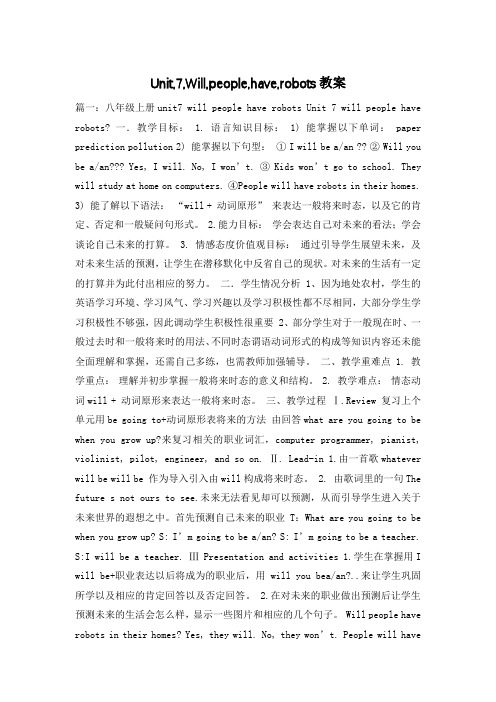
Unit,7,Will,people,have,robots教案篇一:八年级上册unit7 will people have robots Unit 7 will people have robots? 一.教学目标: 1. 语言知识目标: 1) 能掌握以下单词: paper prediction pollution 2) 能掌握以下句型:① I will be a/an ?? ② Will you be a/an??? Yes, I will. No, I won’t. ③ Kids won’t go to school. They will stud y at home on computers. ④People will have robots in their homes.3) 能了解以下语法:“will + 动词原形” 来表达一般将来时态,以及它的肯定、否定和一般疑问句形式。
2.能力目标:学会表达自己对未来的看法;学会谈论自己未来的打算。
3. 情感态度价值观目标:通过引导学生展望未来,及对未来生活的预测,让学生在潜移默化中反省自己的现状。
对未来的生活有一定的打算并为此付出相应的努力。
二.学生情况分析 1、因为地处农村,学生的英语学习环境、学习风气、学习兴趣以及学习积极性都不尽相同,大部分学生学习积极性不够强,因此调动学生积极性很重要 2、部分学生对于一般现在时、一般过去时和一般将来时的用法、不同时态谓语动词形式的构成等知识内容还未能全面理解和掌握,还需自己多练,也需教师加强辅导。
二、教学重难点 1. 教学重点:理解并初步掌握一般将来时态的意义和结构。
2. 教学难点:情态动词will + 动词原形来表达一般将来时态。
三、教学过程Ⅰ.Review 复习上个单元用be going to+动词原形表将来的方法由回答what are you going to be when you grow up?来复习相关的职业词汇,computer programmer, pianist, violinist, pilot, engineer, and so on. Ⅱ. Lead-in 1.由一首歌whatever will be will be 作为导入引入由will构成将来时态。
Unit 7 Will people have robots教案
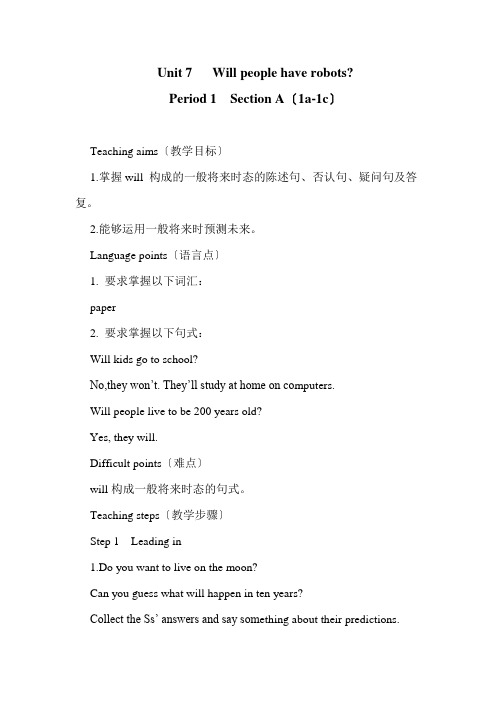
Unit 7 Will people have robots?Period 1 Section A〔1a-1c〕Teaching aims〔教学目标〕1.掌握will 构成的一般将来时态的陈述句、否认句、疑问句及答复。
2.能够运用一般将来时预测未来。
Language points〔语言点〕1. 要求掌握以下词汇:paper2. 要求掌握以下句式:Will kids go to school?No,they won’t.They’ll study at home on co mputers.Will people live to be 200 years old?Yes, they will.Difficult points〔难点〕will构成一般将来时态的句式。
Teaching steps〔教学步骤〕Step 1 Leading in1.Do you want to live on the moon?Can you guess what will happen in ten years?Collect the Ss’ answers and say som ething about their predictions.Step 2 Pre-task1. Look at the picture: How will the world be different in the future, 100 years from now? We’re going to talk about sth. in 100 years.2. Read each predictions to the class .Explain the new vocabulary.3. Read the instructions .Make sure Ss know what they should do.4. Do it by themselves.5. Talk about the answers with the class.Explain :一般将来时态构成: will / be going to + 动词原形Step 3 Work on 1aPractice reading the six predictions.Check the answers.Step 4 Listening1. Read the instructions to Ss. Circle the things you hear on the recording.2. Play the tape twice.At the same time, check the answers.Step 5 Pair work1. Pay attention to the dialogues.2. Read the dialogues fluently.3. Pair work. Work in pairs to make predictions according to the sample.4. Ask several pairs to share their conversations to the class.Step 6 Homework1. Make predictions about yourself in 10 years.Write down 5 sentences.2. Revise the new words .。
《八年级英语 Unit 7 Will people have robots》教学设计
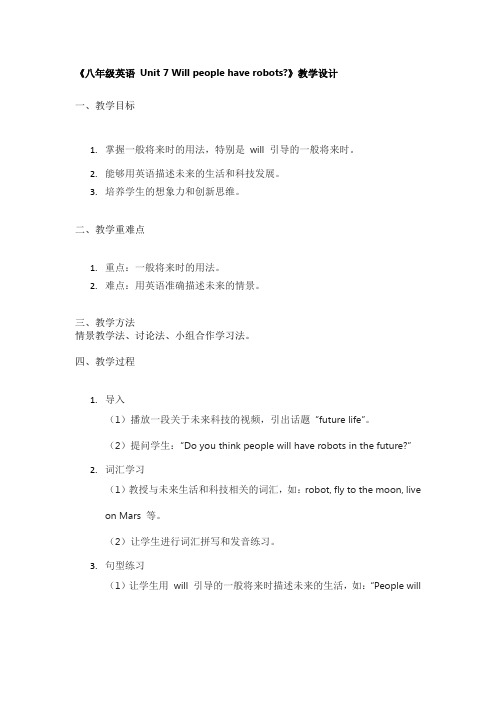
《八年级英语Unit7Will people have robots?》教学设计一、教学目标1.掌握一般将来时的用法,特别是will引导的一般将来时。
2.能够用英语描述未来的生活和科技发展。
3.培养学生的想象力和创新思维。
二、教学重难点1.重点:一般将来时的用法。
2.难点:用英语准确描述未来的情景。
三、教学方法情景教学法、讨论法、小组合作学习法。
四、教学过程1.导入(1)播放一段关于未来科技的视频,引出话题“future life”。
(2)提问学生:“Do you think people will have robots in the future?”2.词汇学习(1)教授与未来生活和科技相关的词汇,如:robot,fly to the moon,live on Mars等。
(2)让学生进行词汇拼写和发音练习。
3.句型练习(1)让学生用will引导的一般将来时描述未来的生活,如:“People willhave more free time.Robots will do most of the housework.”(2)小组活动,讨论未来的学校、家庭、交通等方面的变化。
4.听力训练(1)播放课本听力材料,让学生完成听力任务。
(2)检查答案,讲解重点内容。
5.阅读教学(1)学生阅读课本中的文章,了解未来的生活预测。
(2)提出问题,让学生回答,加深对文章的理解。
6.口语表达(1)让学生分组进行未来生活情景模拟,如未来的课堂、家庭聚会等。
(2)每组推选代表进行表演。
7.总结归纳(1)总结一般将来时的用法。
(2)引导学生对未来生活充满期待和积极的态度。
8.作业布置(1)完成课后练习。
(2)写一篇短文,描述自己心目中的未来生活。
Unit 7 will people have robots教案

Unit7 Will people have robots? 教学内容1学习并掌握基本的单词和短语2学习will 表将来的用法。
3There be 结构将来时的表示方法教学目标1能够掌握课标要求的四会:paper , pollution, future2能够预测未来,运用一般将来时进行表述。
重点难点1Will 构成的一般将来时的句式。
2There be 句型的一般将来时。
3运用一般将来时对未来进行预测。
4掌握以下重点句子○1People will have robots in their homes.○2Will people use money in 100 years?No, they won′t. Everything will be free.○3They will study at home on computes.○4There will be more/less/fewer○5What′s your prediction about the future?I think there will be more pollutions.教学过程Step1. Greet the classStep2. PresentationLanguage Goal: Make predictions.Step3 Listening1Listen and circle the predictions you hear in1a1. Practice reading the six predictions.2. Read the instructions to students .Let students circle the things they hear on the tapes3. Play the tape twice4. Play the tape a third time .At the same time, check the answers.Step4. Pair workAsk and answer question about the predictions in 1a1. Pay attention to the dialogue.2. Read the dialogue fluently.3. Pair work.Work in pairs to make predictions according to the sample.4. Ask several pairs to act out the conversations to the class.Step5. ListeningListen and circle the words you hear and check the predictions you hear.1. Read the predictions.2 .Read the instructions and point out the sample answers.3. Play the tape twice, Let students circle the words theyhear in each sentences; more ,less, fewer4. Check the answers.Step6Role-play the conversationsMake conversations about the predictions in 2a and 2b.1. Point to the example in the sample dialogue .Practice reading.2. Look at the conversations in 2a.Group work. Take turnsto make conversations about the predictions.Steps7. SummaryThis class we have learnt some adverbs. And we have learnt to talk about our future .After class you should remember the words in this part and finish your homework.Step8. Homework1. Make predictions about yourself in 10 years. Write down 5 sentences.2. Go over the new words.。
Unit 7 Will people have robots.(5课时学案)
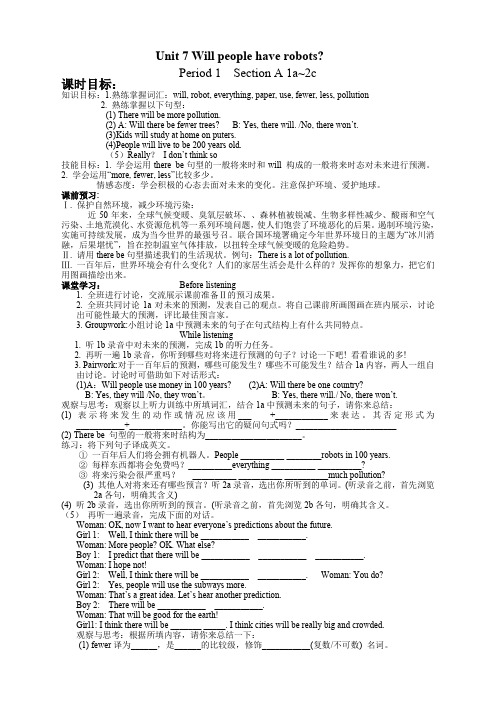
Unit 7 Will people have robots?Period 1 Section A 1a~2c课时目标:知识目标:1.熟练掌握词汇:will, robot, everything, paper, use, fewer, less, pollution2. 熟练掌握以下句型:(1) There will be more pollution.(2) A: Will there be fewer trees? B: Yes, there will. /No, there won’t.(3)Kids will study at home on puters.(4)People will live to be 200 years old.(5)Really?I don’t think so技能目标:1. 学会运用there be句型的一般将来时和will 构成的一般将来时态对未来进行预测。
2. 学会运用“more, fewer, less”比较多少。
情感态度:学会积极的心态去面对未来的变化。
注意保护环境、爱护地球。
课前预习:Ⅰ. 保护自然环境,减少环境污染:近50年来,全球气候变暖、臭氧层破坏、、森林植被锐减、生物多样性减少、酸雨和空气污染、土地荒漠化、水资源危机等一系列环境问题,使人们饱尝了环境恶化的后果。
遏制环境污染,实施可持续发展,成为当今世界的最强号召。
联合国环境署确定今年世界环境日的主题为“冰川消融,后果堪忧”,旨在控制温室气体排放,以扭转全球气候变暖的危险趋势。
Ⅱ. 请用there be句型描述我们的生活现状。
例句:There is a lot of pollution.Ⅲ. 一百年后,世界环境会有什么变化?人们的家居生活会是什么样的?发挥你的想象力,把它们用图画描绘出来。
课堂学习:Before listening1. 全班进行讨论,交流展示课前准备Ⅱ的预习成果。
2. 全班共同讨论1a对未来的预测,发表自己的观点。
Unit7Willpeoplehaverobots学案(人教新版八年级上)

Unit 7 Will people have robots【学习目标】1)学习一般将来时:情态动词will + 动词原形表达一般将来时态。
2)学会表达自己对未来的看法;学会谈论自己未来的打算。
【重点和难点】1) 学习掌握一般将来时态的意义和结构,情态动词will + 动词原形。
2) 掌握There be句型的一般将来时态的结构。
3)掌握more/fewer;more/less的用法。
【重点和难点】充分预习,区分一般现在时、一般过去时和一般将来时。
【知识点探究】句型:一般将来时:(1)一般将来时表示将来某个时间要发生的动作或存在的状态,常与表示将来的时间状语连用,如tomorrow, next week, next year,soon, in a month, in the future等。
Eg: He will help his sister with her lessons next week. 下周他将帮助他妹妹做功课。
[肯定形式:主语+will +V原型.否定形式:主语+wi ll not (won’t) +V原型.一般疑问形式:Will +主语 +V原型?肯定回答:Yes, 主语(人称代词) + will.否定回答: No, 主语(人称代词)+ won’t.特殊疑问形式:特殊疑问词 + will +主语 +V原型?2. There be 句型:(1) there be 句型表示客观存在的“有”(所有者不明确)。
例如:有湖边有很多树。
many trees near the lake.be 动词有两种形式。
(2) be 动词形式的确定要根据其后面的名词单复数形式来确定。
an apple tree in the park.many people in the park today.(3)There be 句型表将来时的结构:肯定形式: + be+其它.否定形式: + be+其它.疑问形式: + be+其它?肯定回答:否定回答:单词:Paper n. 纸(不可数名词),“一张纸”表示为“”,“两张纸”表示为“”.Pollute v. pollut(e) + ion→ n. 污染常见词组: air pollution pollution 水污染3. future n. 常用词组:将来4. play a part in…是一个固定短语,表示“参与……;在……中尽自己的一份力量”词组:“在(做)某事中尽自己的一份力量”Eg: Everyone should saving the earth. 译:5. peace n. 和平 world peace 世界和平 make peace with sb. 译:peaceful adj. 和平的apartment n. 一间公寓 apartmentdangerous adj. 危险的,不安全的danger n.危险处于危险中处于(极大的)危险中8. agree v. 同意词组:同意某人eg: 我同意你。
《U7 Will people have robots?1》学案(省优获奖)

Unit 7 Will people have robots?学习目标:ords and expressions.2.will 构成的一般将来时态区别之前所学知识课标要求:1.will 构成的一般将来时态区别之前所学知识2.There be 句型的一般将来时目标达成:.对自己的未来充满希望,做一个有理想的人。
学习流程:【课前展示】课前展示:你能在课文中找到以下短语吗?请把它们翻译出来。
未来,将来_____________ 每件事物__________机器人_________________ 一张纸__________won't=__________________ they'll=__________创境激趣:了解机器人的知识【自学导航】翻译以下句子。
1.People will have robots in their homes.2,People won’t use money. Everything will be free.3,Kids won’t go to school . They’ll study at home on computer.4,There will only be one country5,There will only be one country.6,People will live to be 200 years old.【展示提升】典例分析知识迁移看看下面几句话有什么特点?你能总结出来吗?A) I'm leaving tomorrow.I'm going to be a basketball player when I grow up.这两句话都可以表述___________________时态,它的根本结构是1________ _ _ ____ 。
2 。
B〕People will have robots in their homes in 100 years.Kids will study at home on computers in ten years.想一想这两句话是什么意思?【强化训练】There be 句型的将来时结构为_________ _ __________,例如:明天我们学校将会有一场篮球比赛。
unit7Will people have robots导学案

兰河一中导学案编号:yingyu7037评价与反思:兰河一中导学案编号:yingyu7038A. Cities will not be crowded and polluted any more in the future.B. There will be a lot of trees everywhere and the environment will be beautiful.C. People will use less water and plant more trees to save the earth in the future.(3) Listen and repeat. The read aloud for 5 minutes to recite(4)Role-play the conversation.1.about. prep.关于 It’s a book ____________the future .这是一本关于未来的书2.move to 搬到.. We have to_______________ other city.3.play a part in (doing) sth. 参与,在..中扮演角色,起作用.Everyone should play a part in__________________(save) the earth.3. 自我检测你对Grammar Focus的理解, 完成3a,相信你是最棒的1)In the future,there will be_______ fresh water because there will be ___pollution in the sea.2)In 100 years,there will be _____cars because there will be__________ people in the cities.3)There will be_______ jobs for people______ robots will do the same jobs as people.4) I think there will be_______ cities because people will build ______buildings in the country.5) In 50 years, people will have ______ free time because there will be _______ things to do.观察与思考:通过刚才的填空练习,你发现下面这些用法的规律了吗? (1)预测某人将来的情况应该采用______________时态。
- 1、下载文档前请自行甄别文档内容的完整性,平台不提供额外的编辑、内容补充、找答案等附加服务。
- 2、"仅部分预览"的文档,不可在线预览部分如存在完整性等问题,可反馈申请退款(可完整预览的文档不适用该条件!)。
- 3、如文档侵犯您的权益,请联系客服反馈,我们会尽快为您处理(人工客服工作时间:9:00-18:30)。
Unit 7 语法:一般将来时will一.一般将来时的概念★____________________________________________________________________________________ ★____________________________________________________________________________________ ★____________________________________________________________________________________ ★____________________________________________________________________________________三.一般将来时的句式结构1.肯定句:___________________________________________________________________________ Maybe his prediction will come true one day.Kids ___________________ (study) at home on computers, they won't go to schoolWe ___________________ (have) a picnic tomorrow.He ___________________ (come back) the day after tomorrow.My dream ___________________ (come true) some day.Cities will be crowded in 50 years.It _____________ Christmas soon.Today is Saturday. Tomorrow_____________Sunday.He ______ ______thirty years old this time next year.The environment _______________ in great danger in the future.2.否定句:__________________________________________________________________________________________ Kids will study at home on computers, they won’t go to schoolPeople _________________ (not use) paper money in the future.They _________________ (not go) to visit the factory next month.Miss Xu _________________ (not teach) us English two years later.The Browns_________________ (not be) at home tomorrow.3.一般疑问句:_______________________________________________________________________________________ Will people have robots at their homes? Yes, they will No, they won’t.______ people ____________ live in other planets? (be able to) Yes,_____ ______. No, _____ ______. ______you __________ buy a new apartment? (buy) Yes,_____ ______. No, ______ _______. ______you ________ any trees around your house? (plant) Yes,_____ ______. No, ______ _______. 4.特殊疑问句:_______________________________________________________________________________________ What will the future be like?What will he do this afternoon?Why will you be here on Sunday?Wh o will arrive here this afternoon?Where will you go next week?四.there be 句型的一般将来时1. 肯定句:___________________________________________________________________________ There will be only one country in the future._______ _____ _____ world peace in the future._______ _____ _____more people and cars in the future._______ _____ _____ a basketball match tonight.2.否定句:__________________________________________________________________________________________ There won’t be rain tomorrow._______ _____ _____ any meetings this Friday._______ _____ _____ blackboards in the classroom in the future.3.一般疑问句:______________________________________________________________________________________ Will there be world peace?Yes, there will. No, there won’t._______ _____ _____ a new space station? Yes,_____ ______. No, ______ _______._______ _____ _____ less pollution? Yes,_____ ______. No, ______ _______._______ _____ _____ more free time? Yes,_____ ______. No, ______ _______.4.特殊疑问句:_______________________________________________________________________________________ When will there be a chance for us to meet?★注意:there be 结构的将来还有there is /are going to be , 而不是there is /are going to haveHe is going to write a letter tonight.He will be twenty years old.I’m going to see her tomorrow.I hope it will be warm tomorrow.Look at the clouds. There is going to be a storm.六.其他时态表示将来的情况1.用现在进行时表示将来go , come , leave , return , arrive , start , fly , 等表示位移动的词,e.g. He is coming soon.I am leaving for Qingdao tomorrow.2.用一般现在时表示将来。
在时间状语从句和条件状语从句中,用一般现在时表示将来的动作或状态。
e.g.What is Jack going to do when he grows up?What would Susan like to be when she grows up?We will go hiking if it doesn’t rain tomorrow.I will phone you as soon as Tom comes back.走,我们疯狂练习去!一、用所给词的适当形式填空1.There ______ ______(be )an American film next week.2.They ______ _________(finish)the work this afternoon.3.Tom ______ _______(play) football with us tomorrow.4.Robots _______ _______(do) lots of work in our homes in the future.5.There _______ ________(be)strong winds tonight.6.He _______ ________(be)back in three hours.8. I ______(be)tired. I __________(go)to bed early tonight.9. Mary’s birthday is next Monday, her mother _________(give)her a present.10. It is very cold these days. It ______________(snow)soon.二、句型转换(转为否定)1.I`ll join them. I _______ ___________ them.2.It will be Christmas soon. It _____ _________ Christmas soon.3.There will be a sports meeting in our school next Wednesday.There ______ __________ a sports meeting in our school next week.4.The child will take the bus to school. The child _______ _______the bus to school.5. We’ll visit the museum tomorrow. We_______ ______ the museum tomorrow.三、句型转换(转为一般疑问句)1.I`ll join them. ______ ______ join them? 回答:Yes,______ ______ .No,_______ ______2.It will be Christmas soon.____ ____ ____ Christmas soon?回答:Yes,______ _____ .No,_______ ______.3. She will have an English lesson the day after tomorrow.? 回答:Yes,______ _____ .No,_______ ______.______ _______ have an English lesson the day after tomorrow?4. There will be a party this evening. ______ ______ be a party this evening? ?回答:Yes,______ _____ .No,_______ ______.. he (give)a talk on “Works of art”next Friday?No, he _______. He ______ (visit) the Palace Museum.(7)11. —_____ you _____(be)here this Saturday?—No. I ______(visit)my teacher.17.---_____ you _____ (be) at home tomorrow afternoon? ---No. I _____ .4 。
